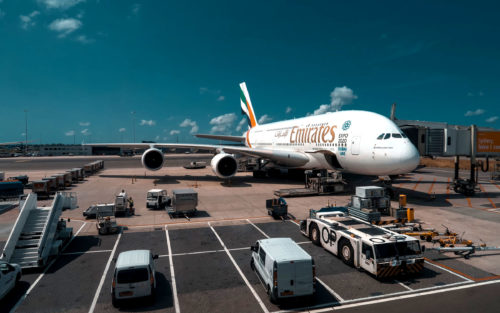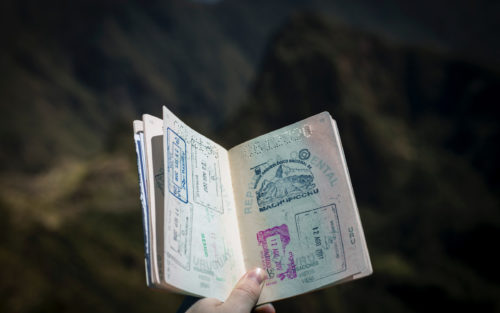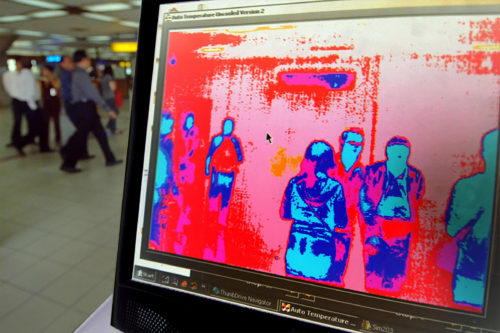The COVID-19 pandemic has created an economic crisis that the world’s airlines have never seen before. The commercial airline industry is facing unprecedented financial uncertainty due to a crisis that was not caused by any internal mismanagement or a specific enemy (as with the attacks of 9/11.) Here are the 7 ways coronavirus may change future air travel.
For the US domestic carriers, this is “The Great Depression” of their time. For Americans, and perhaps all of the world’s residents, it may well be on the same (if not greater) scale.
At the outset, perhaps many of the large airlines based in the north western hemisphere were less concerned about the impact on travel due to the coronavirus travel restrictions. However, the spring travel season is currently shutdown. Now the prospect of a dismal (if any) summer travel period shakes the airlines to their core. On the other side of this pandemic, this crisis, the coronavirus will change future air travel.
According to Business Insider, at least 55 global airlines have completely stopped flying scheduled flights due to travel bans, airspace closures, and low demand for travel.
Previous Historical Disruptions to Air Travel
The 9/11 Terrorist Attacks On the US Changed Air Travel
Immediately after the 9/11 terrorist attacks on America, US airspace was closed for four days. That is distinctly different from the situation caused by the coronavirus pandemic. Post 9/11, the airline industry quickly persuaded the public that new security measures (TSA) made air travel safe. Six weeks after September 11, things started climbing back up to normal. Disease, especially a novel virus, is much harder to fight against and reassure the public of the safety of air travel quickly.
Every government on Earth has instituted some form of travel restrictions. For the airlines, this makes the complexities of flying and the financial consequences much more difficult to deal with.
The travel industry is holding out hope that when the pandemic is over, and travel restrictions are lifted, there will be a pent-up demand for leisure travel stimulated by people wanting to resume life and get back to their vacation plans. Others maintain that business travel might be permanently dampened once business travelers become accustomed to the virtual business place. We shall see.
The 2008 Financial Crisis Changed Air Travel
The recession dealt a huge blow to financial markets around the world. Globally, the travel industry lost billions. Many airlines were forced into bankruptcy.
After thousands of travel jobs were lost in 2008, it has been a slow trek back to full employment for the industry. Many small travel agencies closed, and much of the momentum migrated to online bookings. More than 13,000 travel agents are still gone from the peak prior to 2008’s recession.
Travel at that time was an economic barrier. 9/11 was a fear of security. Both situations were solved in different ways and in different time frames.
The current coronavirus pandemic brings into focus an economic loss, plus a fear of an unseen enemy. The US Travel Association has predicted the US could lose 4.6 million travel related jobs in 2020 that would exact over an $800 billion shortfall on America’s economy.
It took nearly 10 years for the airlines and travel industry to regain the strength it had in the pre-recession years.
The economic impact cannot be understated!
The 10 countries with the most reported cases of coronavirus (China, the United States, Italy, Spain, Germany, Iran, the Republic of Korea, France, Switzerland and the United Kingdom ) account for 53% of world tourism expenditures. Of course these are the same factors which contributed to the rapid spread of the virus. Travelers from these countries interacted with infected persons on a more rapid scale than other world citizens. They helped spread the virus and their countries are paying the price in a relatively proportional manner. It’s almost a cliché that it’s a #FirstWorldProblem, yet it has been carried to nearly every corner of the planet.
Perhaps this latest threat will take another 12-18 months, as many experts have suggested. But one thing is for sure; the coronavirus will change future air travel.
Travel Companies Are In Jeopardy
Nowhere has any one company been so impacted on a large scale as the TUI Group. TUI is the world’s leading tourism group; operating more than 1,600 travel agencies and leading online booking portals, 5 airlines, over 400 hotels, 18 cruise liners, many tour operators and incoming agencies in all major destinations around the globe. In 2019, TUI reported sales of more than €19bn ($USD 10.9 Billion.) Revenue would have been greater if they had not taken a 300 million euros charge for grounding their Boeing 737-MAX aircraft. After the COVID-19 pandemic, TUI Group announced it is temporarily suspending the “vast majority of all travel operations until further notice.”
There are no bailouts for TUI. Although they have secured government-backed loans from KfW, Germany’s state-owned development bank.
Chief Executive Officer, Fritz Joussen, said in a statement, “We are currently facing unprecedented international travel restrictions. As a result, we are temporarily a company with no product and no revenue.”
The World Tourism Organization (UNWTO), in its updated assessment of the potential impact of COVID-19 — based on the optimistic assumption that the tourism industry will experience a swift recovery over the next 3-4 months — projects that, “For the whole year 2020, tourist arrivals will have fallen 20-30% from 2019, and international tourism revenues will have plunged by $300 billion to 450 billion, almost one third of the $1.5 trillion generated in 2019.”
A Call For Action
As quoted in the Floridian Press, Senator Mark Rubio proclaimed that
“Congress has an obligation to act” and “ensure the aviation industry has the resources to remain operational. We will have a very different country if the airline industry were to collapse. The implications for the economy, for public health, and for our national security would be staggering and we cannot allow it to happen.”
Yes, governments do have an obligation to act. At the same time they must set standards for actions needed to deal with future crises. It’s more than just the travel industry, it’s the national economy. As a result, our experience with the coronavirus will change future air travel.
7 Ways Coronavirus May Change Future Air Travel
Consolidation
Almost certainly the commercial airline industry will see consolidation. From an economic perspective it makes a lot of sense and there’s a lot of historical data to support the argument. When companies with a strong customer base and lots of assets start to struggle, usually a larger player swoops in to acquire the struggling business.
The 2008 recession produced a lot of candidates for acquisition. Delta Airlines merging with Northwest Airlines, and the 2015 acquisition of Orbitz by Expedia are just two examples. Cheaper stock valuations offer attractive prices for valuable assets.
Looking ahead, post-coronavirus pandemic, we should see less airlines operating globally as were operating 60 days ago and less travel companies. (We may even see two or less cruise lines, but that’s a subject for another article.)
It’s easy to picture Alaska Airlines and Jet Blue in a merger to survive post-coronavirus. There are a lot of European and Asian airlines that have already ceased operations or are operating on the brink of financial collapse. Nationalization of some might provide short-term relief – like Italy’s Alitalia. Look for their governments to sell off those carriers quickly after the dust has settled.
Travel Restrictions
As countries saw the impact of open borders for most visitors, governments responded rapidly playing chess with travel bans and restrictions to protect themselves from the pandemic. It is walking a fine line for those countries whose economy relies heavily on tourist dollars.
Some countries have isolated their citizens and completely closed borders to any travel. Each one is measuring the risks and rewards of such actions and policies.
Going forward, we should not be surprised to see more travel restrictions for foreigners wishing to visit other lands. Visas will probably be fewer and harder to get. Perhaps new health requirements will be affixed to the needed application documentation. Expect a lot fewer free visa reciprocity programs or ‘visa on arrival’ destinations.
Health Screening
In keeping with the thought of travel restrictions, airports will certainly monitor temperatures on a more regular basis. Thermal scanning of passengers became commonplace in many Asian countries early in the coronavirus pandemic. Followed quickly by western nations. Look for this and other measures to be enhanced.
As technology advances we’ll see more health-related screenings coming to major airports. Editor Sara shares an article on Biometric Screening Technology which should be an enhancement for future airport queues.
Sanitation
One of the first actions airlines offered to comfort the fears of passengers was the assurance that aircraft would be regularly sanitized. This begs the question – why didn’t the airlines do more earlier, in previous years? It wasn’t a priority to them. Let’s hope it remains a practice that is carried forward. Several of my colleagues have remarked how clean the cabin has been on recent flights they have taken.
It probably will become much more of a standard practice for airline and airport employees to use gloves more habitually and everyone (including travelers) should use hand sanitizer regularly.
Frequent Flyer Programs
In the past frequent flyers really helped carry the airlines back from bankruptcy, along with the American taxpayers. It’s pretty safe to say that airlines will offer some good deals to their elite flyers. These will vary among carriers but we are already seeing one or more of the following from your favorite frequent flyer program:
Extended Elite Status Expiration – It seems only logical that airlines would extend elite status for those who are unable to fly to meet the current year’s travel requirements. Whether its miles, segments or dollars spent on tickets, airlines will have to make adjustments. Those announcements are premature as we don’t really know how long this crisis will last.
Bonus Elite Qualification Miles – For travel (maybe 2X or even 3X for higher-priced premium cabin tickets).
Reduced Targets for Elite Qualification – If the airlines can get more travelers loyal to their programs, they can leverage those elites to help the airline get back on track sooner.
Better Protections for Airline Employees
Under the terms of the payroll grants (provided in the recently passed Coronavirus Stimulus Act) airlines cannot lay off any employees before September 30th, 2020. Many airline industry employees have been furloughed, laid off, fired or asked to take time off without pay. For many, the personal economic burden is heavy to themselves and their families.
Even with unions representing many flight attendants (Delta’s flight attendants are not unionized) there is little protection for the average airline employee. This realization should help unions and legislators to provide more support after the industry gets on its feet again.
Protection in the form of personal safety (right to wear gloves, masks, etc…) should come into their own in the near future. These protections should be here to stay and guaranteed for all workers.
Carbon Emissions
Airlines have used the coronavirus to appeal to governments both in the United States and in Europe to lower the goals set for carbon emissions. US lawmakers dropped a provision on the House bill which would have required tougher emissions standards as a condition for the airline bailout on the recently passed CARES Act. (Coronavirus Stimulus Act.)
In Europe, the European Union Commission denied an appeal for emissions trading extension by the airlines. The airlines had argued for relief based on the COVID-19 crisis.
RELATED POST: Ryanair Competes With Coal As Top EU Polluter
Although a mixed result, carbon emissions from airlines might be getting better in the future. Dealing with the complexities of regulations during the pandemic, both the European Commission and the Federal Aviation Administration recently acknowledged their rules regarding gate assignments were counter-productive. Accordingly, this week they suspended rules that require airlines to fly a certain percentage of their flights in order to hold onto their allotted time slots. Before these announcements, many airlines were forced to operate “ghost flights.” This is flying empty planes with no passengers in order to hold onto desirable takeoff and landing slots. Previously, European and U.S. regulations required airlines to use their slots at least 80% of the time or potentially lose those slots to competitors.
If these rules are not as strict going forward, the environment may actually benefit from lower carbon emissions. Perhaps we can coordinate the incentives to reduce emissions and the inducements to utilize scarce commodities like landing slots in ways that contribute to climate protection.
Click here for all the latest coronavirus updates and policies by airline and hotel, travel insurance, stimulus payment, and expert advice posts
The UpShot
In a recent memo to employees, American Airlines CEO Doug Parker expressed “We certainly hope and expect that by that time [September 30th, 2020 arrives] the virus will be contained, Americans will be flying again and we will be back to flying a full schedule.”
That’s certainly optimistic thinking.
What is happening here and now — the complete ruin of global travel and tourism — has never happened before. As a consequence, we are in uncharted waters air.
For sure, air travel will return; it’s been growing in popularity steadily over the past decade. Regardless of when air travel picks up its prior momentum, coronavirus will change future air travel for a long time.
What are your thoughts on how air travel will change going forward?
The responses below are not provided or commissioned by the bank advertiser. Responses have not been reviewed, approved or otherwise endorsed by the bank advertiser. It is not the bank advertiser's responsibility to ensure all posts and/or questions are answered.



1 comment
[…] Ways Coronavirus May Change Air Travel: Check out this interesting post on Point Me to the Plane. I agree that we may see stricter visa requirements that are possibly tied to health […]